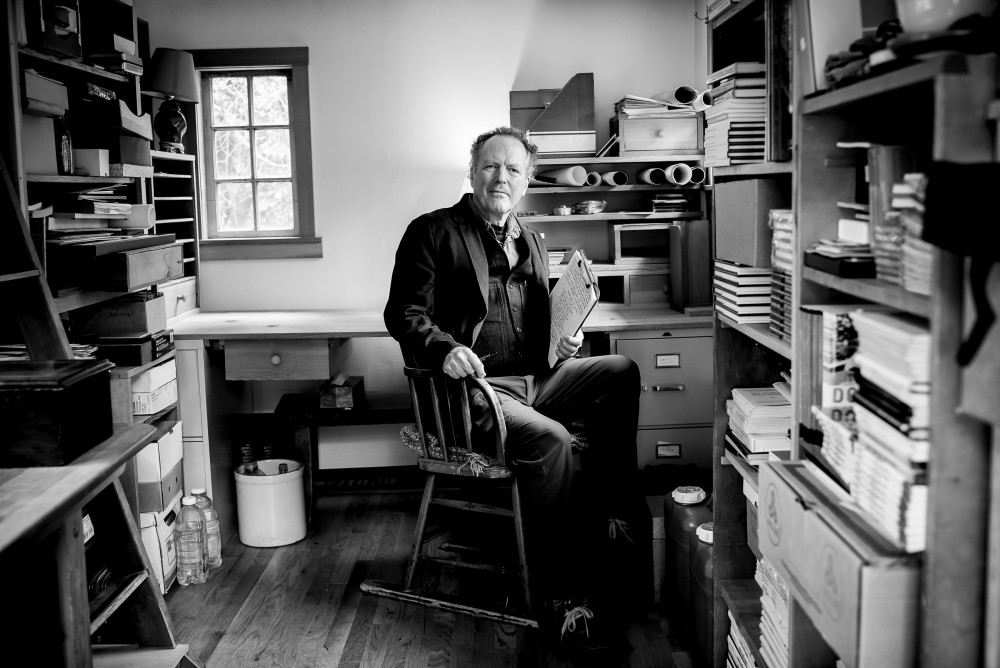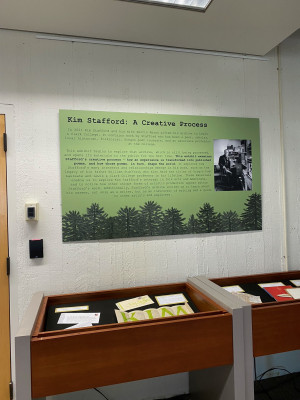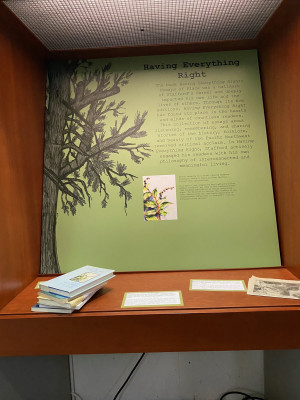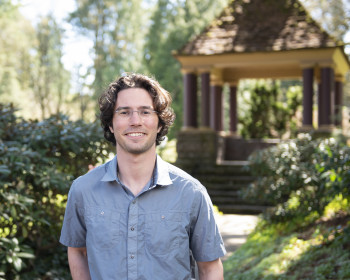Former Poet Laureate Shares Treasure Trove of Poems, Early Writings
Fans of former Oregon Poet Laureate Kim Stafford can get a never-before-seen look at early drafts of his poetry—and the folk art and Americana that informed them—at an exhibition devoted to the Kim Stafford Archive. The exhibition, located in Watzek Library, will be on view from March 18 to August 20, 2022.

In 2021, Kim Stafford and his wife, Perrin Kerns, gifted his archive to the college. Now, for the first time, the public will have an opportunity to view a selection of these materials. The focus of the Kim Stafford Archive is on his creative process—how an experience in the world is transformed into a published poem, and how those poems, in turn, shape the world. It considers how Stafford’s many creative influences emerge in his work, including his interest in folk art and Americana. The archive also explores Stafford’s career as an educator within an Oregon-based creative community.

Credit: Franchesca Schrambling BA ’22Lewis & Clark students Liam Conley BA ’23, Franchesca Schrambling BA ’22, and Ben Warner BA ’22 curated the exhibition along with staff from Watzek Library’s Special Collections and Archives.
Like his father, William Stafford, Kim Stafford is an acclaimed writer of poetry and prose. He has penned more than a dozen books of poetry, most recently Singer Come from Afar (Red Hen Press, 2021), a meditation on conflict, peace and essential questions raised by the pandemic. From 2018 to 2020, Stafford served as Oregon’s ninth poet laureate, a role that Governor Kate Brown describes as an “ambassador of poetry across the state.” His father, William Stafford, held the title from 1975 to 1990.
Dr. Hannah Crummé, head of special collections and college archivist at Lewis & Clark, said it seems particularly appropriate that Stafford chose to gift his personal archive to Lewis & Clark. The former poet laureate’s life and work have been intertwined with the history of Lewis & Clark for decades. He grew up down the street from the college, where his father taught. Later, in 1986, Kim Stafford founded the Northwest Writing Institute at Lewis & Clark, an incubator of writing and creative thought in Portland. Like his father, Kim also taught at the college: in Kim’s case, for more than 40 years.
Interested in learning more about this exhibit? Read about how it got started.
Kim Stafford is the second Stafford to have his archives housed at Lewis & Clark. In 2008, the Stafford family gifted the college the William Stafford Archives, a collection of William Stafford’s private papers, publications, photographs, recordings and teaching materials. Together with Kim Stafford’s materials, the archives show a legacy of writing at Lewis & Clark.

Credit: Franchesca Schrambling BA ’22“William’s archive and Kim’s archive speak to each other,” Crummé says, citing in particular their relevance to students of English, philosophy and creative writing. “It’s interesting to see where father and son come together and inspire one another, and also where they diverge.”
For Stafford, there is a personal resonance to sharing his “fifty years of scribbling” with the college. “I’ve been a part of Lewis & Clark since 1949, the year I was born. So isn’t it destiny that my father’s writings and mine should live here together?” he asks. “A library is a home for the past, but I like to think an archive is a home for the future–a place where ideas, both formed and half-formed, might seed new thoughts and new worlds.”
It is Stafford’s hope that the archive will encourage and inspire students to examine their own life stories with a sharper eye. As he sees it, the archive is not about himself, but “about how something in it may kindle a response in you.”
“I’m honored that the college will guard my work and make it available to the campus and the community,” says Stafford.
More Newsroom Stories
Public Relations is located in McAfee on the Undergraduate Campus.
MSC: 19
email public@lclark.edu
voice 503-768-7970
Public Relations
Lewis & Clark
615 S. Palatine Hill Road MSC 19
Portland OR 97219

